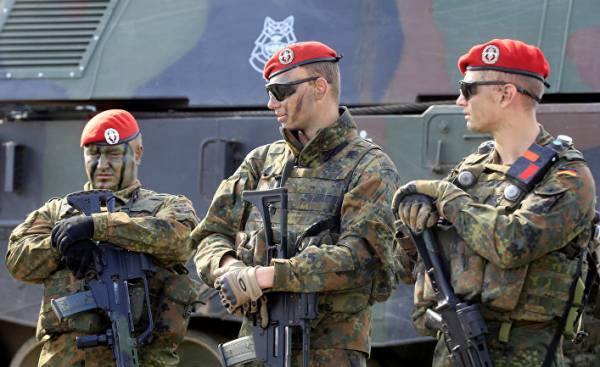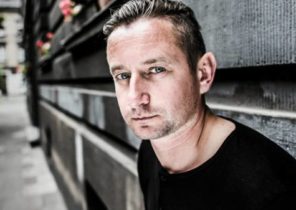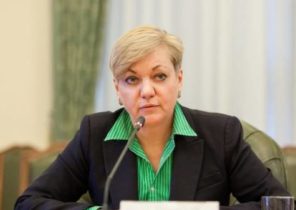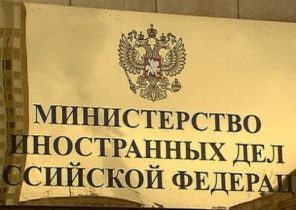
To the town on the Lithuanian-Belarusian border šalčininkai in the last few months had the attention of the whole of Lithuania: there have been teachings that stirred up the local community. However, without exercise, life here is not honey Mazan: people complain about unemployment, emigration, small pensions.
As reported in the city during organized 11 APR MIA the exercise simulated the response to military in uniform without insignia — the so-called “little green men”. This scenario reminded the annexation of Crimea in 2014, when the region began to operate Russian military without insignia in civilian clothes.
Later, the Minister of internal Affairs Eimutis Misunas, stated that in conducting organized by the Ministry of internal Affairs (MIA) of the exercise training weapons should not be used as it was meant to be a question of creation of so-called people’s Republic of Šalčininkai. The city stirred and hushed, as if again began to live its usual life.
However, life here is not as calm as it seems at first glance. The inhabitants met the Delfi in the main square of the city, where, by the way, is a monument to one of the most international poets Adam Mickiewicz, complain about the lack of work, the problem of emigration, low salaries and pensions. It’s interesting that they all speak Russian or Polish, and Lithuanians joke that had forgotten their native language. About the future of the city, sighing, say with optimism, but there are those who are nostalgic for the old times… “I’m an optimist, I think that everything will improve, of course, time will tell, just a pity that the young leaves, deeply sorry. And go not in Vilnius or Kaunas and abroad. But maybe something will change for the better,” says a local pensioner.
In Šalčininkai district, which is very close to the Lithuanian-Belarusian border, is home to 31 800 inhabitants (data of the statistics Department at the beginning of 2017), of them of working age — 20 thousand, able-bodied youth — 5 thousand 641, pensioners — 6 thousand 200. This is one of the Polish districts of Lithuania: there are 79.5% of poles, 10,4% — Lithuanians, 5,0% Russian, 2.9%, and Belarusians, 1.2 percent — other nationalities (2015).
However, socio-economic indicators all is not well. However, according to the mayor of Šalčininkai district, June 1 this year, the unemployment rate reached a record low level was 7.9%, but the reason is the season: with the arrival of summer there are more jobs in agriculture and construction. And in the beginning of the year the unemployment rate amounted to 10.9 per cent. In recent years, Šalčininkai district, the unemployment rate ranged from 12.3% to 9.1%. The average for Lithuania, the figure ranges from 7%.
According to “Eurostat”, the natural population growth per thousand inhabitants in 2015, on average in Lithuania amounted to minus 3.6%, and in Šalčininkai district — minus 5%. For 16 years, from 2001 to 2017 the population of the district decreased by 20%. This region is also characterized by an aging population. The percentage of residents of retirement age in the district in 2017 amounted to 19.5%. The number of suicides in the area in 2 times higher than the average for Lithuania.
A young mother of two children, Alicia walks in the center of the construction of the fountain with the child. He says he is happy with life in the city, and she has nothing to compare: a woman who finished school in šalčininkai, continued studies at the Vilnius and Klaipeda. “I really like the construction, though, I always thought I wanted to live in Vilnius. I studied there, but I didn’t like it, too noisy. And here I like, especially while young, with children. There are playgrounds, relaxed, everything is in place. With a work hard, little pay, not to compare with Vilnius”, lists the pros and cons of living in the city Alicja.
The woman has two children and says she would be difficult to get a job without the help of parents. “As for my friends, many of them went abroad. Who has richer parents, they opened their business. In fact, few of your friends or classmates been here — you are all going to Vilnius and England. And only one pair of acquaintances is going to return, they have a child. And who has no children, they earn. Arrive and immediately start to get bored, there’s nothing to do,” the woman said.
On the question of which language prevails in the city, Alicia responds that the poles in the city more, but “more say in Russian”. “I myself studied in a Polish school, this school has a high level of teaching at Lithuanian schools of lower level. Maybe now there will be something to change, but it used to be. As for the signs in Polish or records of Polish names in passports, I don’t know who you are, I don’t care. Litter only us, poles, Lithuanians. I do not need signs,” she says.
Years of study in Vilnius, she recalls with some resentment on the teachers. “I was in Vilnius, and studying the Lithuanian language I teacher once said: you have a Russian name, good grades do not wait. I said I was in Polish school, to which she replied: it means that the rating will be even worse. Indeed, had several times to go to achieve better grades. Then I was studying at Klaipeda University. Ramerica, so there is already the surname was not paying attention. My Lithuanian language is not great, as I have for so many years I have lived here, heard the accent, but there was not a problem,” says Alicja.
She stresses that she last drew heed to the nationality of the person, but the younger generation, it is alarming that “we have a lot of the Russian language”. “Lithuanian youth does not want to learn Russian, there are few who know him — says Alicja. — As for doctrines, this, of course, very bad. I was not there at this time, but Facebook friends included a live broadcast, so everything is seen. Of course, forget all this, because of the sentiment that it would be better then Poland was not. Even if you compare Polish culture and language, we are not as they speak. Traditions we have a Lithuanian, and holidays too. We feel part of Lithuania. Motherland — Lithuania”.
Pensioner Irene accompanies his neighbor to the station and alternately says something in Russian, then Lithuanian. “When we were young, it was needed, and now we don’t need” — waving neighbor and hurries to the train station. Meanwhile, Irena is more optimistic and says that the city is changing: the Park was put in order. “As for the language, then we, the Lithuanians, their language forgotten, it is better here to speak in Russian or Polish. I am from the Trakai district, but there are already 62 years living. Son moved to Kaunas and worked at the Ignalina 18 years, now lives in Vilnius. The youth here do not want to live, all go abroad. Already and elderly go to work, work abroad by teachers or old people are looked after” — said the pensioner.
“About the teachings we did not know anything, but I saw two policemen, two police officers, then came home to see police cars, everything was visible, over there by the trees. We do not think, because I didn’t know anything. Then there were a lot of cars, and then we thought something happened”, — says Irena.
Female actively follows the news and watches most of the local news channels. “I’m very actively watching TV, most of the news since 1988, when then there’s all these tents were. A lifetime spent on the legs, worked part-time as a cashier, but now I see it’s covered in corruption, it takes thousands of one, then the other. Scandals and street names or letters in passports — but what difference does it make? My name is Prismant, my husband was Polish, I’m Lithuanian, the son of a Russian school ended, the grandson of the pole already considers himself. And I believe that it’s better to be a pole, but to know the Lithuanian language. We have here no one realizes that I’m Lithuanian because I speak very well in Russian. While in Russia, a mess, or there is no truth, nor here”, says the woman, without a parting word, turns home.
At the fountain we meet a middle-aged woman who does not want to give his name, but answers the questions and also striking bilingualism abilities: constantly switches from Russian into Lithuanian and Vice versa. “I’m an optimist, I think that everything will improve, of course, time will tell, just a pity that the young leaves, deeply sorry. And go not in Vilnius or Kaunas and abroad. But maybe something will change for the better. So live and think that much better then we all will be, and Lithuania to be beautiful. Return from abroad of our people, gain there experience, their views will change, anyhow, from their land, from their homeland no one refused,” she says.
“No matter what nationality you are, it matters where you were born, is the most important thing, she continues. Write here all about signs, about the family, but it is important that people lived well, everyone to have a job to retirees with a good pension received. And so you can go to relax and not count every penny — to go or not to go, will help children or not. It is often still themselves children need help”, — says a resident of šalčininkai.
The woman says that she carries the different blood — Ukrainian and Lithuanian, were among her ancestors and the Russian old believers. “But still not the main nationality and people. In government, not only Lithuanians, but also poles there are many. Most importantly, what will they do for their country, their land?” — asks the woman. She notes that the pension is slightly raised, but what is the 20 Euro? But if a person is sick if he is disabled, it is very difficult for that kind of money to live.
“Were these teachings we have, and people did not react, I walked past and only at the end of time. Stood, he thought that perhaps it exercises some… And then my husband told me how everything was… People just perceive it all. And how can we know where that takes place? Here the son is difficult to understand what he had in mind. And the authorities will figure out what you want, and then people blame” — throws up his hands retired.
“And people’s heads are different too, who is it that thinks and supports whom, is unknown. As in the family — husband and children all speak their own language and about their. But I know one thing — everyone wants to live well, to work, were retired good to young families with children are not left”, — concludes his story by a resident of biržai and in a hurry.
A bit further on a bench sit three middle-aged men. The faces and manner of speaking it is clear that the struggle with alcohol has the opposite effect. They are willing to share their thoughts about living in šalčininkai and memories of the years “past glory”. “I’m a Belarusian, but have long been living in šalčininkai. He served in the Soviet army. And if anything, I would like to return to the Soviet Union then was the order, the oath. And what is the army? When I retired from the army, commander-in-chief was Yazov, now in Russia — Shoigu. And then it was something, and now work there, hang out there. And in Shanghai, we šalčininkai called, everything is fine, the mayor of normal, can not say anything. Just before was a normal military office, and now God knows what,” says Edward.
His colleague continues: “You watched the movie “flying Squadron of hussars”? Homeland said to do… And here you explain to me what the difference is Motherland and birthplace? After all, we were the hot spots, it is necessary to serve…” This idea picks up Edward:
— We used to serve, what to serve. What now?
And Lithuania has no desire to protect?
— It does not matter! But for years-years…
“When there was a drill, I saw it all. We stood outside the post office. People came out with the loaf, I wanted to get him, and then Aras, so they grabbed him and took. The police had been brought, probably from around our district. This is ridiculous! And about the people’s Republic, no one could say no, we live here fine, everything is good. All this talk about “little green men” — that’s stupid! I already live here 25 years and I have no complaints there. I have an icon of the Soviet army and I’m not letting anyone here, because I live here. I really like the construction, not just words. But problems with work,” says Edward.
Social activist and a native of šalčininkai Yulia Matskevich established and headed the European centre for the development of democracy, and in 2008, along with her sister created a youth center for young people of šalčininkai, which in total has conducted more than 100 projects in Lithuania and abroad. Her long-time dream — the release of a free newspaper for the national communities — in the near future also true.
According to Yulia, the young šalčininkai pretty Patriotic, in favor of Lithuania and, in General, sees himself in Lithuania, but, like all young people, faced with a lack of work and the only reason is leaving. “In General, the region needs more initiatives. In addition, Lithuania has to accept these people, they are the same citizens of Lithuania. Lithuanian society of their very off-putting, it’s a problem not only of the people themselves, it is a problem of the whole society. The dialogue must go from both sides, I do not see, are only a single initiative, but that government policy was directed to this dialogue, I do not see”, — he said.
She emphasizes that especially important well thought out government policy in this direction, however, initiatives such as doctrine, held in April in šalčininkai, only aggravate the whole thing. “If we are called the people’s Republic, I personally find it very insulting. I was born and raised in Lithuania and now will go to war for someone else? This is just ridiculous. In fact recently, once a poll was held throughout Lithuania, and quite a lot of people said that nostalgia for the Soviet Union and look towards the East, towards our neighbor. Done purely because of the language, Yes, many watch Russian television, because we live in Lithuania. We — Lithuanians,” — said social activist.
The mayor of Šalčininkai district zdzisław Palevich, noted that the economic situation of the district is not different from other regions of Lithuania. “I can say that the economic and social situation in Šalčininkai district is no different from the situation in other areas. We are constantly trying to improve, strive to provide favorable living conditions for the residents of our региона4, — said the mayor. Answering the question about unemployment, he confirmed, the unemployment rate in the district is 7.9%, while across the country is 7.1%.
“So, we are in 32nd place in the Republic of Lithuania. This result is achieved by consistent, focused and intensive work. The youth unemployment rate Šalčininkai area and across the country is 3.8%,” leads the numbers the mayor. However, according to data of the Department of statistics at the beginning of 2017 in Šalčininkai district, there were 523 active economic agents, meanwhile, in Trakai — 755, Ukmergė — 739, Telšiai — 1034, Mazeikiai — 1516. According to the Lithuanian labour exchange on 1 June this year, the unemployment rate in Šalčininkai district remained one of the highest in Vilnius County (7.9 per cent), meanwhile, Elektronskom area it was 4.6%, Trakai district — a 5.7% overall in the Vilnius County is 6.2%. Average salary “on paper” in 2016, the district was 560 euros, at the time, as the average in Lithuania — about 800 euros.
“As for emigration, according to this indicator our area in Lithuania occupies the 6th place. Feature of emigration in our area is that residents go to work in Vilnius but living in Šalčininkai district,” — said the mayor. He was unable to give statistics of how many people left the area lately and did not mention any programs to prevent the emigration of young people. According to the Department of statistics in 2001 from the area left 480 people, in 2016 — 1486. Palevich, also commented on the initiative of Lithuanian politicians in connection with the establishment of a special Fund of Eastern Lithuania. “The basis for the establishment of a Fund of Eastern Lithuania does not meet our needs. The Central government on the Eastern Lithuania needs to look holistically, not as a platform for implementation of individual actions”, — concluded the mayor.







